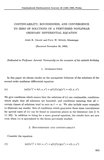Article
MSC:
34A34,
34C11,
34C15,
34D05,
34D10 | MR 1354925 | Zbl 0851.34050 | DOI: 10.21136/CMJ.1995.128549
Full entry |
 PDF
(2.0 MB)
Feedback
PDF
(2.0 MB)
Feedback
 PDF
(2.0 MB)
Feedback
PDF
(2.0 MB)
Feedback
References:
[1] Z. S. Athanassov: Boundedness criteria for solutions of certain second order nonlinear differential equations. J. Math. Anal. Appl. 123 (1987), 461–479. DOI 10.1016/0022-247X(87)90324-6 | MR 0883702 | Zbl 0642.34031
[2] J. W. Baker: Stability properties of a second order damped and forced nonlinear differential equation. SIAM J. Appl. Math. 27 (1974), 159–166. DOI 10.1137/0127013 | MR 0350138 | Zbl 0289.34067
[3] R. J. Ballieu and K. Peiffer: Attractivity of the origin for the equation $\ddot{x} + f(t,x,\dot{x})\*|\dot{x}|^{\alpha } \dot{x} + g(x) = 0$. J. Math. Anal. Appl. 65 (1978), 321–332. MR 0506309
[4] L. H. Erbe and Z. Liang: Qualitative behavior of a generalized Emden-Fowler differential system. Czech. Math. J. 41 (116) (1991), 454–466. MR 1117799
[5] S. R. Grace and B. S. Lalli: Oscillation and convergence to zero of solutions of damped second order nonlinear differential equations. J. Math. Anal. Appl. 102 (1984), 539–548. DOI 10.1016/0022-247X(84)90191-4 | MR 0755982
[6] J. R. Graef, L. Hatvani, J. Karsai, and P. W. Spikes: Boundedness and asymptotic behavior of solutions of second order nonlinear differential equations. Publ. Math. Debrecen 36 (1989), 85–99. MR 1047021
[7] J. R. Graef and P. W. Spikes: Asymptotic behavior of solutions of a second order nonlinear differential equation. J. Differential Equations 17 (1975), 461–476. DOI 10.1016/0022-0396(75)90056-X | MR 0361275
[8] J. R. Graef and P. W. Spikes: Asymptotic properties of solutions of a second order nonlinear differential equation. Publ. Math. Debrecen 24 (1977), 39–51. MR 0454188
[9] J. R. Graef and P. W. Spikes: Boundedness and convergence to zero of solutions of a forced second-order nonlinear differential equation. J. Math. Anal. Appl. 62 (1978), 295–309. DOI 10.1016/0022-247X(78)90127-0 | MR 0492527
[10] A. Halanay: Differential Equations: Stability, Oscillations, Time Lag. Academic Press, New York, 1966. MR 0216103
[11] L. Hatvani: On the stability of the zero solution of certain second order non-linear differential equations. Acta Sci. Math. (Szeged) 32 (1971), 1–9. MR 0306639 | Zbl 0216.11704
[12] L. Hatvani: On the asymptotic behavior of the solutions of $(p(t)x^{\prime })^{\prime } + q(t)f(x) = 0$. Publ. Math. Debrecen 19 (1972), 225–237. MR 0326064
[13] L. Hatvani: On the stability of the zero solution of nonlinear second order differential equations. Acta Sci. Math. (Szeged) (to appear). MR 1243290 | Zbl 0790.34046
[14] J. Karsai: Attractivity theorems for second order nonlinear differential equations. Publ. Math. Debrecen 30 (1983), 303–310. MR 0739492 | Zbl 0601.34039
[15] J. Karsai: Some attractivity results for second order nonlinear ordinary differential equations. in: Qualitative Theory of Differential Equations, B. Sz.-Nagy and L. Hatvani (eds.), Colloquia Mathematica Societatis János Bolyai, Vol. 53, North-Holland, Amsterdam, 1983, pp. 291–305. MR 1062654
[16] Š. Kulcsár: Boundedness, convergence and global stability of solutions of a nonlinear differential equation of the second order. Publ. Math. Debrecen 37 (1990), 193–201. MR 1082298
[17] Š. Kulcsár: Boundedness and stability of solutions of a certain nonlinear differential equation of the second order. Publ. Math. Debrecen 40 (1992), 57–70. MR 1154490
[18] A. C. Lazer: A stability condition for the differential equation $y^{\prime \prime } + p(x)y = 0$. Michigan Math. J. 12 (1965), 193–196. DOI 10.1307/mmj/1028999309 | MR 0176168
[19] K. S. Mamii and D. D. Mirzov: Properties of solutions of a second-order nonlinear differential equation on a half-axis. Differentsial’nye Uravneniya 7 (1971), 1330–1332. MR 0288349
[20] S. N. Olekhnik: The boundedness of solutions of a second-order differential equation. Differentsial’nye Uravneniya 9 (1973), 1994–1999. (Russian) MR 0333345 | Zbl 0313.34031
[21] B. K. Sahoo: Asymptotic properties of solutions of a second order differential equation. Bull. Calcutta Math. Soc. 83 (1991), 209–226. MR 1199402 | Zbl 0755.34028
[22] F. J. Scott: New partial asymptotic stability results for nonlinear ordinary differential equations. Pacific J. Math. 72 (1977), 523–535. DOI 10.2140/pjm.1977.72.523 | MR 0466793 | Zbl 0366.34040
[23] F. J. Scott: On a partial asymptotic stability theorem of Willett and Wong. J. Math. Anal. Appl. 63 (1978), 416–420. DOI 10.1016/0022-247X(78)90087-2 | MR 0481295 | Zbl 0383.34042
[24] P. W. Spikes: Some stability type results for a nonlinear differential equation. Rend. Math. (6) 9 (1976), 259–271. MR 0409980 | Zbl 0346.34034
[25] N. Vornicescu: On the asymptotic behavior of the solutions of the differential equation $x^{\prime \prime } + fx = 0$. Bul. Stiint. Inst. Politehn. Cluj 14 (1971), 21–25. MR 0318608
[26] P. X. Weng: Boundedness and asymptotic behavior of solutions of a second-order functional differential equation. Ann. Differential Equations 8 (1992), 367–378. MR 1192175 | Zbl 0765.34053
[27] D. Willett and J. S. W. Wong: Some properties of the solutions of $(p(t)x^{\prime })^{\prime } +q(t)f(x) = 0$. J. Math. Anal. Appl. 23 (1968), 15–24. MR 0226117
[28] J. S. W. Wong: Some stability conditions for $x^{\prime \prime } + a(t) x^{2n - 1} = 0$. SIAM J. Appl. Math. 15 (1967), 889–892. DOI 10.1137/0115077 | MR 0221042
[29] J. S. W. Wong: Remarks on stability conditions for the differential equation $x^{\prime \prime } +a(t)f(x) = 0$. J. Austral. Math. Soc. 9 (1969), 496–502. DOI 10.1017/S144678870000745X | MR 0241772 | Zbl 0184.11905
[30] E. H. Yang: Boundedness conditions for solutions of the differential equation $(a(t)x^{\prime })^{\prime } + f(t,x) = 0$. Nonlinear Anal. 8 (1984), 541–547. DOI 10.1016/0362-546X(84)90092-0 | MR 0741607 | Zbl 0537.34030

